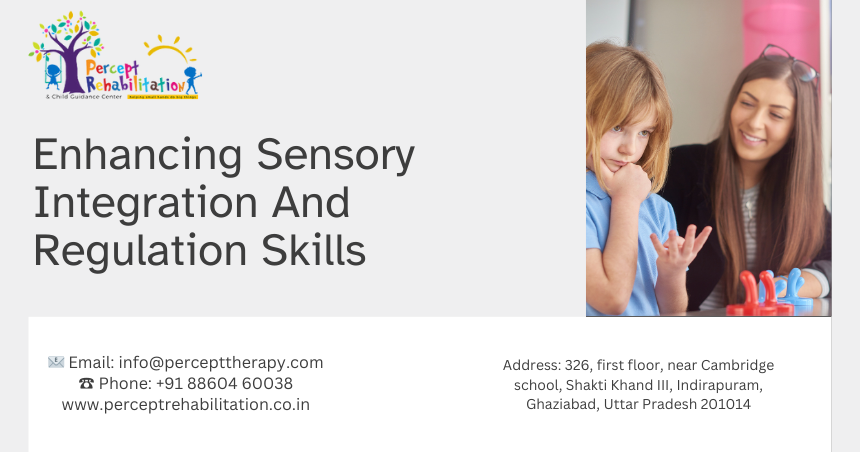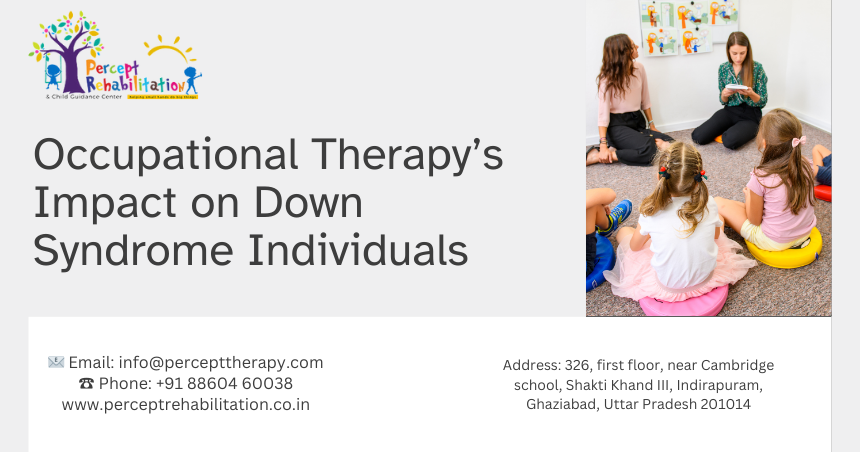When a child doesn’t reach physical, emotional, or cognitive milestones on time, it often leaves parents anxious and searching for support. Whether it’s delayed crawling, difficulty holding objects, limited attention, or trouble socializing, each delay points to a potential disruption in development. Early intervention from a qualified occupational therapy center in Indirapuram can make a crucial difference.
Milestones aren’t just boxes on a checklist. They reflect the brain’s communication with the body through movement, coordination, and response. When delays appear, they’re more than just late achievements; they may indicate deeper concerns affecting the child’s independence and long-term ability to function in daily tasks.
Occupational therapy (OT) is not a luxury but a necessity for many children facing developmental hurdles. It helps build foundational skills necessary for success in school, social settings, and self-care.
What Are Developmental Milestones and Why Do They Matter?
Developmental milestones are behaviors or skills seen in children as they grow. They serve as benchmarks for typical development in areas such as:
- Gross motor skills (e.g., walking, sitting, crawling)
- Fine motor skills (e.g., picking up small objects, drawing)
- Speech and language
- Cognitive skills (e.g., problem-solving, memory)
- Social and emotional behaviors
Delays in these areas may not always mean something serious, but consistent lags often require a deeper assessment. A child who is not speaking words by 18 months, struggles with balance beyond the toddler years, or avoids eye contact may need targeted interventions.
Causes Behind Delayed Milestones
Several factors can contribute to a delay in development. These include:
- Premature birth
- Genetic disorders
- Neurological issues
- Birth complications
- Environmental deprivation
- Sensory processing disorders
Each child is different, and no single reason fits all. What matters most is timely identification and support tailored to the child’s specific challenges.
How Occupational Therapy Helps Children with Developmental Delays?
Occupational therapy focuses on helping children participate in everyday activities. For children with delays, this means helping them build skills they’ve missed or are struggling to acquire. These can include dressing, feeding, toileting, writing, or even playing.
A structured OT program can help a child:
- Improve fine and gross motor skills
- Develop better body awareness
- Manage sensory input (e.g., over-sensitivity or under-responsiveness)
- Gain independence in daily routines
- Strengthen attention and focus
- Develop appropriate social interaction skills
The goal is not just to help them catch up, but to make life easier, safer, and more manageable.
Signs That a Child May Need Occupational Therapy
Some delays may be obvious, while others are subtle. Parents, teachers, or caregivers should look for the following red flags:
- Difficulty holding or manipulating toys
- Late crawling or walking
- Trouble using utensils or zippers
- Easily overwhelmed by light, sound, or textures
- Poor balance or frequent falls
- Avoidance of certain movements (e.g., swinging, climbing)
- Limited interest in playing with peers
- Short attention span or difficulty following instructions
These signs don’t confirm a diagnosis but suggest that an occupational therapy evaluation may be necessary.
Role of Sensory Integration in Development
One of the biggest challenges for children with developmental delays is sensory processing. This refers to how the brain interprets and reacts to input from the environment.
Children with poor sensory integration may:
- Be hypersensitive to touch or sound
- Avoid messy play or unfamiliar textures
- Have meltdowns in crowded or noisy environments
- Seek constant movement or pressure (like bumping into things)
Occupational therapy includes sensory integration techniques that help regulate these responses. Over time, children learn how to manage their reactions and stay calm, alert, and engaged in their environment.
List of Common OT Techniques Used for Developmental Delays
Occupational therapists use a variety of evidence-based techniques depending on the child’s needs:
- Therapeutic Play: Encourages the development of motor, cognitive, and social skills
- Sensory Diets: Tailored routines to manage sensory input throughout the day
- Handwriting Exercises: Builds fine motor control, pencil grip, and coordination
- Visual Motor Integration Tasks: Improves eye-hand coordination
- Adaptive Strategies: Teaching how to use assistive tools or modify tasks
- Balance and Coordination Training: For stability and movement confidence
- Behavioral Reinforcement Techniques: Encouraging appropriate reactions and actions
Long-Term Impact of Occupational Therapy
Early intervention with occupational therapy isn’t just about catching up. It’s about empowering children to:
- Gain independence in self-care
- Participate confidently in school settings
- Form healthy peer relationships
- Improve self-esteem
- Handle transitions and new environments better
- Reduce emotional outbursts or frustration
When the brain is young and adaptable, therapeutic efforts go a long way in establishing long-term growth patterns.
Role of Family in Therapy Progress
Therapy does not end when the child leaves the OT room. Involving family in the therapeutic process boosts progress significantly. Parents are encouraged to:
- Follow through with home-based activities
- Maintain open communication with therapists
- Observe and track progress
- Offer praise and encouragement for small victories
- Be consistent with routines and schedules
Family support builds emotional security and strengthens the impact of therapy sessions.
School Readiness and OT
Many children with developmental delays struggle when entering a structured classroom. They may:
- Find it hard to sit still
- Unable to hold a pencil properly
- Avoid interaction with classmates
- Be unable to follow multi-step instructions
Occupational therapy helps bridge this gap. Children are prepared not just academically but also physically and emotionally to handle the demands of school.
Social Skills and Emotional Regulation
Delayed milestones can affect how a child engages with others. They may withdraw, become overly aggressive, or lack awareness of social cues.
OT works on these interpersonal areas by:
- Teaching turn-taking and sharing
- Practicing facial expression recognition
- Role-playing social scenarios
- Teaching calming techniques during overstimulation
These skills improve classroom behavior, friendships, and general confidence.
Real-Life Challenges OT Can Address
Even outside therapy sessions or schools, children face challenges. OT addresses real-world difficulties like:
- Brushing teeth or combing hair
- Eating a variety of foods
- Sleeping through the night
- Getting dressed without frustration
- Managing time and transitions
By turning these struggles into achievable tasks, OT helps integrate therapy into everyday routines.
Building Confidence and Self-Worth
Children who struggle often feel left out or “different.” They notice they can’t do what their peers do and may develop anxiety or low self-worth.
Occupational therapy builds self-esteem by:
- Setting achievable goals
- Celebrating every win
- Encouraging independence
- Teaching that differences don’t mean inability
Confidence becomes the fuel that motivates further development.
When to Seek Help and What to Expect
If concerns about developmental delays persist, don’t wait for things to resolve on their own. Early support is more effective. Families can start by:
- Speaking with a pediatrician
- Getting a referral for an occupational therapy evaluation
- Setting realistic expectations
- Creating a collaborative plan with therapists
- Monitoring and adjusting the plan as needed
A delay caught early can often be managed with less effort than one addressed years later.
Collaboration with Schools and Professionals
OTs often work alongside teachers, special educators, speech therapists, and pediatricians to create a holistic support system. This teamwork ensures consistency across all areas of the child’s life.
Collaboration may include:
- School-based therapy sessions
- Individualized Education Plans (IEPs)
- Teacher training
- Shared reports and progress tracking
When everyone works together, the child receives seamless, integrated support.
The Emotional Journey for Parents
Raising a child with delays brings a unique emotional burden. Worry, guilt, frustration, and confusion are common. OT support offers not just help for the child but reassurance for parents.
Therapists often:
- Provide education on child development
- Offer coping strategies
- Encourage realistic goal-setting
- Reassure through visible progress
Parents are not alone in the journey. A strong therapy alliance helps lighten the emotional weight.



